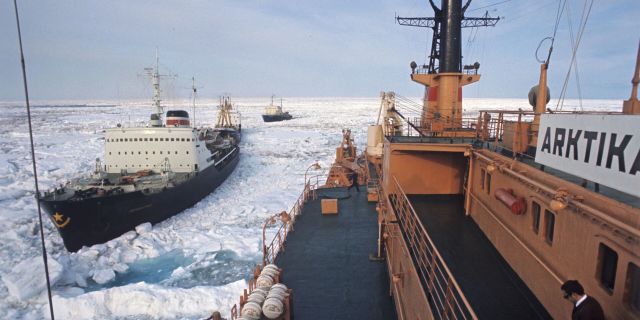A look to the North
In his speech last week, Putin finally clearly outlined the main threat that the Russian Navy is called to fight, writes Junge Welt. This threat is the desire of NATO countries to dominate off the coast of Russia, and in the entire world ocean, too. Measures are proposed to match the danger, and they will primarily affect the Arctic.
Russia's new Maritime Strategy puts control of the Arctic Ocean in the spotlight. The country claims the status of a "great maritime power".
In the new Maritime strategy that has officially entered into force, Russia has confirmed its claim that it also belongs to the "great maritime powers". The date of presentation of the doctrine was not chosen by chance: it coincided with the annual Day of the Russian Navy. President Vladimir Putin used his welcoming speech at the Baltic Fleet parade in St. Petersburg to publicly outline the main provisions of the document.
It says that the desire of the United States to dominate the oceans is perceived by Russia as the greatest threat to its own security at sea. Putin accused NATO of arranging more and more naval maneuvers, and getting closer to the Russian maritime borders and to the coast of Russia. According to him, the Russian navy has the task of "firmly and by all means to protect" the maritime borders of Russia, as well as the interests associated with them. In this regard, Putin said that in the coming months the first ships of the Russian Navy will be equipped with new hypersonic missiles "Zircon". The first such ship will be the frigate Admiral Gorshkov.
By making such a statement, Putin indirectly acknowledged the difficulties associated with the development of "Zircon" in the past years. So, in August 2019, a test sample of the rocket exploded shortly after launch, which led to an increase in radiation levels. The victims of this disaster were several scientists who participated in the development. But now, Putin reports, these difficulties have been eliminated: in May, Russia defiantly launched a Zircon missile at a distance of 1,000 kilometers and, allegedly, it hit the intended target.
But many other goals set by Putin to the Russian navy are matters of the distant future. So, on the Pacific coast, suffering from transport problems and the outflow of population, a complex of military shipbuilding plants should arise. It will take years, if such plans are ever implemented at all. Next, the Russian fleet should receive not one, but several modern aircraft carriers at once. The first attempt to acquire this type of aircraft carrier failed in the 80s due to financial difficulties. Then the unfinished aircraft carrier was sold to China, where there was a casino in it. However, then, as they say, the design of the ship was used by Beijing as a model for the development of its own aircraft carriers.
Other tasks, named by Putin as part of the Maritime Strategy, are included in the document clearly under the impression of recent events. For example, the planned construction of new ferries for the Baltic exclave of Kaliningrad, designed to deprive the basis of future attempts by coastal NATO member states to establish a blockade of the region. During the recent transport crisis, settled with the help of a formal compromise, it became obvious that the region needs not the five cargo ferries currently available, but at least twenty. It will also take time and a lot of money to complete this task.
However, the military aspect is only one of many in the new Russian naval doctrine. It says a lot that Russia should prepare for a situation when the resources extracted on land will run out and it will be necessary to start extracting raw materials primarily in the Arctic Ocean. In general, geographically, it is the north that is the focus of Russia's new Maritime doctrine. The Arctic Ocean in the conditions of climate change will have to be used more intensively for economic purposes.
Russia is not the only country that preaches this idea, and therefore conflicts with the United States, Canada and Denmark, which owns Greenland, are predictable. We are talking, first of all, about the question of how to determine future economic zones. Should we accept the usual limit of 200 nautical miles from the coast, which will make the entire untidy waters of the Arctic Ocean international waters? Or, as Russia imagines it, to keep a report from the edge of the continental shelf, which pushes the border of the economic zone much further into the sea?
But Russia intends to use the Arctic Ocean not only for the extraction of raw materials – as exclusive as possible. The Northern Sea Route along the coast of Siberia should be used as a shorter and now year-round passable transport route between East Asia and Europe. However, as stated in the doctrine, it should be a "national waterway" and not an international maritime "highway" passing through neutral waters.
The new Russian Naval Doctrine is an updated version of the previous one, officially adopted only in 2015. The speed of the emergence of a new Doctrine indicates the dynamic development of the conflict with the United States in the maritime field. At the same time, Putin tried to focus on historical examples: in his speech on the occasion of the Navy Day, he specifically mentioned the traditions of Peter the Great (1672-1725), who first made Russia a "great maritime power."
Reinhard Lauterbach

